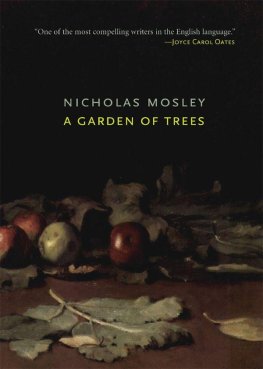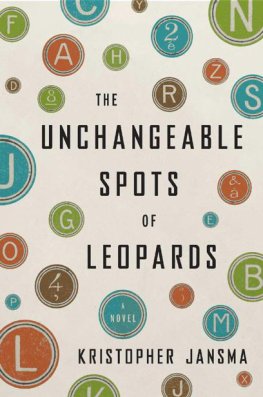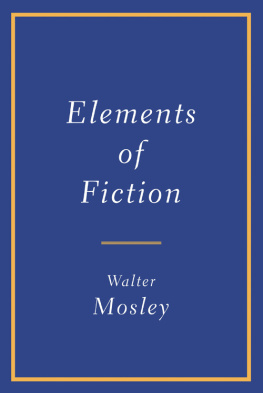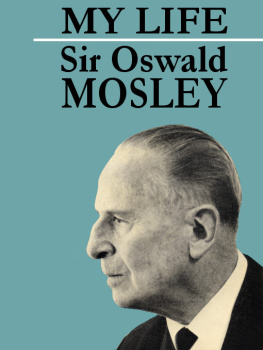Nicholas Mosley
A Garden of Trees
This was my second book, a novel, written in the late nineteen forties and early fifties when I was still trying to settle into peacetime life after fighting in the infantry in the Second World War. My first novel, Spaces of the Dark, was a sad story about a young soldier coming home and being unable to settle, being haunted by a particularly traumatic wartime incident. This book was published by Rupert Hart-Davis and was reasonably well received. My second, A Garden of Trees, was turned down by Hart-Davis and another publisher. I was told It is not unusual for a young author to write a good first novel about his personal experiences; but then with his second he is apt to go off into rigmaroles about a crazy world where a reader is not drawn to follow him. I argued But are not the rigmaroles of a crazy world in everyones personal experience?
A publisher did eventually agree to publish the book, but by that time I was eagerly finishing my third novel and was reluctant to go back myself to worry about A Garden of Trees. So I put it to one side, and the typescript has languished on musty shelves ever since in various houses I have moved between during the last sixty years. Until now, that is, when I am too old to consider starting anything new, but when being on the brink of moving to another new house the old script has unexpectedly popped up as if giving me a nudge. And I have wondered if there might be some interest in a story of that chaotic time so long ago.
When I was writing A Garden of Trees I had been out of the army for three or four years: I had married, had gone on a long honeymoon to a small island in the West Indies where I wrote much of Spaces of the Dark. My wife and I would listen on a small crackling radio to the world news, the main items of which were all about the likelihood of a third world war: Russia with its vast conventional forces and occupied satellite states was said to be threatening to invade the West. So now there were suggestions that since we and the Americans had atomic bombs and the Russians as yet had not, would it not be wise for us to drop a few of our bombs on Russia first before they got theirs, which soon they surely would. Well, was there not enough evidence here for people to experience the world as mad?
My wife and I might have stayed on our tiny island but we did not want to feel quite cut off from even such a world; but we also did not want to feel part of the functioning of madness. So when we got home we looked around, and bought a small hill-farm in North Wales, in an area where my wife had been happy as an evacuee in the war, and for which I had saved up enough money during the war from the income from a trust made by my mothers family in America. We hoped we might thus find some life of sanity away from the belligerence of a confrontation-obsessed world.
We had a go at running our farm as if it were some Garden of Eden with cattle and pigs and a small flock of sheep thrown in. I supposed it was unlikely that we would have made much of a success of it anyway; but soon my wife Rosemary became pregnant; and there was no piped water to the farmhouse, and electricity came from a water-wheel in the village that froze up in winter. And there were no pregnancies in Eden.
We took a break in London for the birth of the baby, and then returned with a helper to our idyll of a stone cottage with its wild mountain stream rushing past the back door. But then Rosemary became pregnant again, and this time there were signs of a threatening miscarriage. Rosemarys family now stepped in with resolute sanity and arranged for her and our child to be taken by ambulance to her grandmothers vast house in Hertfordshire, where they could be attended by nurses and doctors. And here eventually the new baby was born, and flourished. But I had to return to our hillside fastness alone, to see the gradual disposal of our animals. And to get on with the writing of A Garden of Trees.
The story concerns a sister and a brother slightly younger than myself, and the narrator and a slightly older man. We were all of us author and his four characters trying to find a pathway of sanity in what seemed an insane world. And we were all discovering what? that one cannot create ones own Garden of Eden; one can have such a vision, but then has to work for whatever fragments of it one might be able to make real. What one sees around one as the madness of humanity is simply an aspect of the way in which life works: nature is savage; evolution is ruthless and not within ones control. Love is usually for what one has not got, not for what one has. What one has, one can learn to cherish, but what one plants in ones garden is apt to be knocked down like skittles.
One of the blessings or banes that is likely to crop up in such a setting is religion. This is experienced by the characters in A Garden of Trees: it was experienced by myself, that lonely autumn at the farm with hopes and expectations falling like leaves around my head. I had a letter from my oldest friend from childhood and the army saying that he was planning to become a monk. I replied that I thought he was insane. Correspondence swirled and eddied to and fro. My sanity, and that of the scenes I was writing in my book, bobbed up and down like a small boat in a rough sea. It takes a while for such a voyage to discover perhaps never stability, but some buoyancy.
It used to be a tenet of the fashionable literary world and for all I know still is that the experiences of a writers life have no bearing on a consideration of his work. This has always seemed to me a source as well as a symptom of insanity. With the cropping-up of this old script, there should at least be no such danger from my own clumps of trees.
NICHOLAS MOSLEY, 2012
1
It was at a political meeting that I first saw Marius. Sixty policemen went past me in a bus an extraordinary sight. A double-decker bus, the policemen piled on top of each other in rows, like vegetables, prize-winners surely. They all had their helmets on and seemed identical. Or like pelicans, perhaps, with their hard domed heads; but within the little glass cases of the windows more lifeless and remote. The bus was momentarily held up in the traffic and the crowd turned to stare at it. Nobody laughed. Then the traffic moved and the bus swam on a queer intent-looking fish with its belly-load of sixty dispassionate Jonahs. I wondered if it would ever spew them out.
Marius was on the edge of the crowd, on a corner. He watched the bus go by with an expression of grim and happy amazement. He was a huge man, hearty, standing in an old stained raincoat with his hands in his pockets and his tallness leaning forwards to where his head, thrust downwards, seemed to collect the shadows. It was this that I remember in him. The projections of his face his cheek-bones, jawbones, eyebrows appeared to gather the darkness round them as in a too emphatic photograph. It was as if the light came only from the other side of him, although the street was pale and clear with the impersonal glaze of February. His hair too curly or straight, I couldnt tell which seemed to dull the light, absorb it, lying thick upon his head with a quite incidental neatness. He was like some figure in an early silent film. I could not imagine him speaking.
The bus had stopped again a little beyond him, and he went up to it, peering, like a child examining the fish in an aquarium. He walked up the line of windows and then back again; the policemen never moved. Backwards and forwards like the judge at the show. Then he stepped back onto the pavement and smiled.
There was the sudden blast of a loudspeaker. I had come to the meeting idly, as a spectator, because I wanted to see how such affairs were conducted. I was not interested in politics; but I had wanted to see what life there was here, in the streets, among the people who had to make a business of it. I had not found much in the life that I knew. This was the end of the nineteen forties, not long after the war. The loudspeaker was booming, insistent, like a bell rung close to the ear. It surged and eddied on the air in waves, the rolling swing of a bell hitting the ear physically, to pierce it. It knocked the mind off its balance as the rollers of the sea knock the body off its feet. I had no idea where the noise was coming from. The words were unintelligible.












